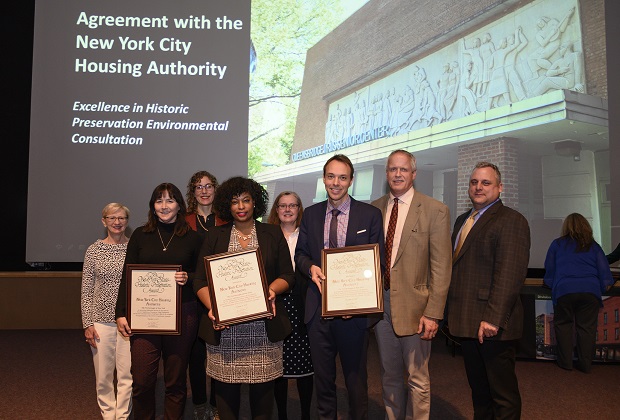NYCHA Wins 2019 State Historic Preservation Award
On December 4, NYCHA was honored by the NYS Office of Parks with a 2019 State Historic Preservation Award for Excellence in Historic Preservation and Environmental Consultation. Among 10 recipients named by Governor Cuomo, the Authority won for its collaboration with State Parks to create a streamlined process for National Historic Preservation Act reviews and for its work on more than three dozen City housing projects now on the State and National Registers of Historic Places. Created in 1980, the State Historic Preservation Awards honor excellence in the protection and revitalization of historic and cultural resources.
“Historic preservation helps encourage reinvestment and revitalization in our cities, towns, and neighborhoods,” State Parks Commissioner Erik Kulleseid said. “This year’s awards demonstrate the extraordinary commitments, hard work, and strong partnerships that have made preservation an important tool for community renewal, economic development, and job growth in New York.”
The historic agreement between NYCHA, HUD, the NYC Department of Housing Preservation and Development, the NYC Landmarks Preservation Commission, and the NYS Office of Parks, Recreation and Historic Preservation has far-reaching significance,” said Steven Lovci, NYCHA Executive Vice President of Capital Projects, who received the award on behalf of the Authority. “It will streamline funding and improvements within NYCHA’s Operations Department, Capital Projects, and Real Estate Development.”
Every project in NYCHA’s capital projects portfolio is subject to a federally mandated environmental review. This process involves assessing the environmental impacts of each project to determine if it meets federal, State, and City environmental standards. One of those standards is compliance with Section 106 of the National Historic Preservation Act of 1966, which requires consideration of the effects on historic properties.
This review happens once a year, as part of HUD’s Five-Year Capital Plan. With over 600 projects in NYCHA’s Capital Projects Division alone, the process was labor intensive and time consuming, with diminished returns. This was especially challenging with routine and duplicated scopes of work at each building.
In 2016, HUD recommended that NYCHA change this approach. HUD suggested that NYCHA obtain a five-year environmental clearance, aligned with the Five-Year Capital Plan, to streamline the yearly process. To do this, NYCHA would need to establish a Section 106 Programmatic Agreement with the State Office of Parks.
The completion of the Agreement moved NYCHA closer to obtaining a five-year environmental review clearance with HUD. “It will create efficiencies within the process, minimize the number of filings with the State, eliminate bureaucracy and uncertainty, and create awareness among our workers of the historical significance of the buildings, grounds, and artwork,” Mr. Lovci noted. “Any tool to speed up our processes benefits the roughly 600,000 residents served by NYCHA.”







